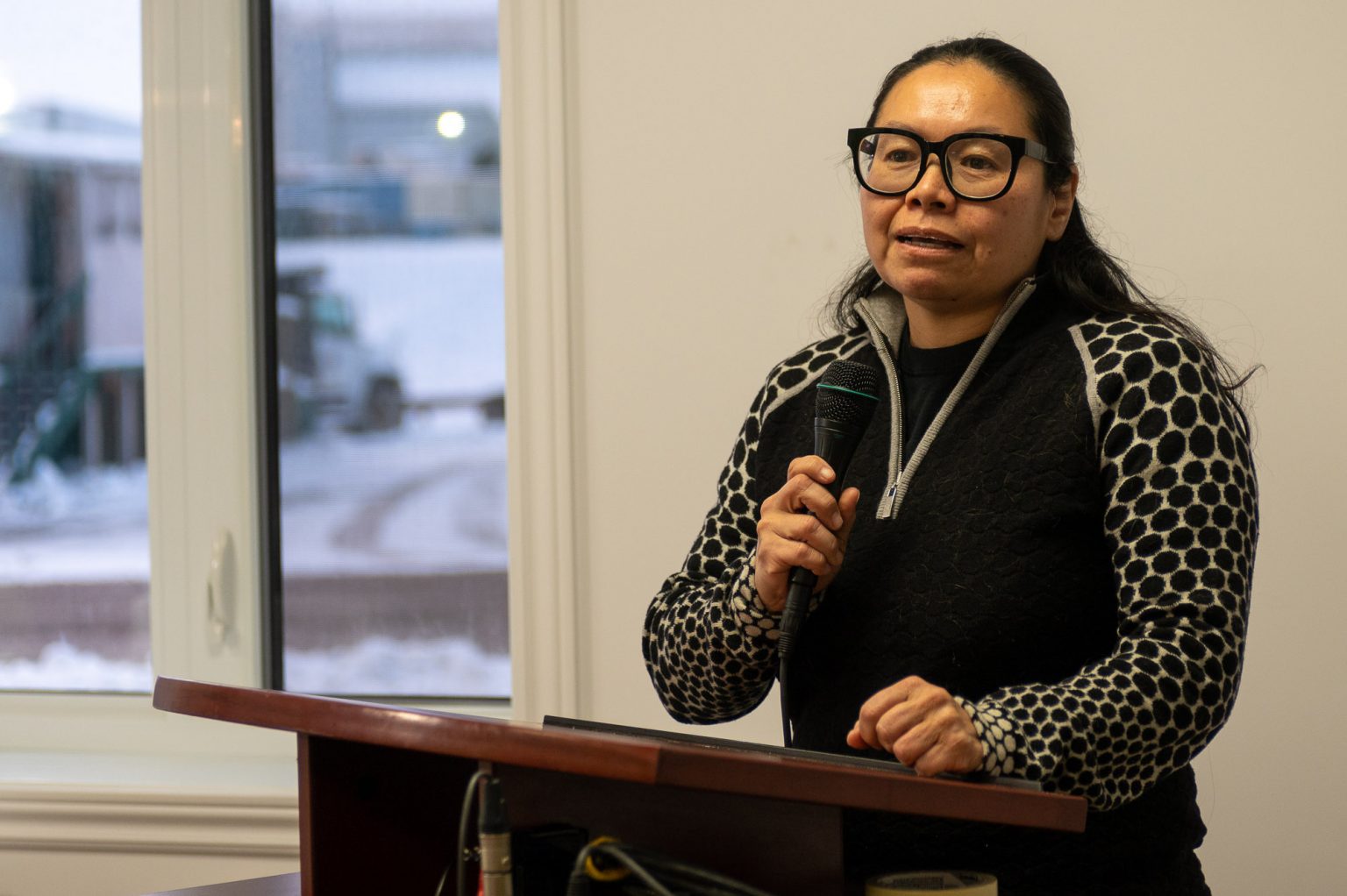Developer of small nuclear reactors names former Iqaluit mayor to advisory board
USNC-Power envisions its reactors powering northern mines and remote communities
Former Iqaluit mayor Madeleine Redfern speaks at the opening of the Uquutaq Society’s new shelter in October 2020. Redfern has been named to the advisory board of USNC-Power, a company that hopes to build Canada’s first small modular nuclear reactor. (File photo by Dustin Patar)
Former Iqaluit mayor Madeleine Redfern has been named to the advisory board of the company developing Canada’s first small modular nuclear reactor.
USNC-Power is building a micro modular reactor in Chalk River, Ont., which is about 200 km north of Ottawa. It aims for it to be operational by 2026.
The company says it hopes to one day roll out this type of reactor in northern mines and remote communities. It generates five megawatts of electricity or 15 megawatts of thermal power.
Redfern will join four other experts on the board, who will advise USNC-Power on community engagement, Indigenous consultation, regulatory affairs, market development and finance strategies.
Redfern, who until 2018 served the mayor of Iqaluit, is also an adviser to the Canadian Nuclear Laboratories, the release said.
“She currently serves as president of Ajungi Consulting Group and COO of CanArctic Inuit Networks, where she has developed a number of high-profile, strategic partnerships in the public and private sectors both domestically and internationally.”
The other members of the advisory board are Dr. Michael Binder, former president and CEO of the Canadian Nuclear Safety Commission; finance executive Francois Lecavalier; John W. McVey, CEO and director of Procon Group of Companies; and Dr. Ken Petrunik, 35-year member of Atomic Energy of Canada.




A low energy small scale reactor would provide clean, renewable reliable and cheap energy to small and isolated communities. The only draw back would be ensuring that communities retained the technical expertise needed to maintain such a system.
Yes….I’d have to agree. Would need adequate sources of cooling water, close enough to Service without huge expenses in transmission and distribution.
Northern Guy has such a nice way of saying that they have to be idiot proof because most things man made break sooner or later. Of course a mini nuclear reactor breaking would likely be a bad thing.
.
Clean? Except for the spent fuel or radioactive contaminated bits & pieces. I may have missed the part where we figured out a permanent solution to this problem.
.
Renewable? Wind, solar, geothermal, even tidal sure. Nuclear, not so much.
.
Reliable? Maybe, but I would like to see the data. I would not want to live next to an unreliable nuclear reactor, would you?
.
Cheap? Ontario’s full scale nuclear reactors proved less than cheap. The price of other solutions have been getting less expensive so do we really need nuclear?
.
I’m not saying that nuclear shouldn’t be considered but I think a stand alone, basically hands off design that will run with minimal maintenance for 40 or 50 years is still a ways off.
.
Let’s hope that more thought goes into the design, construction, and maintenance of a nuclear reactor than goes into a pool, garbage dump, or sewage plant in the north.
It’s noteworthy that among “The other members of the advisory board are Dr. Michael Binder, former president and CEO of the Canadian Nuclear Safety Commission …”.
So the person who was in charge of the agency that regulates nuclear safety in Canada retires – and joins the team of a company proposing to build SMRs. This is a characteristic of Canada’s nuclear cabal: senior officials float back and forth between the industry and the agency that regulates the industry. Is it any wonder that informed critics of the industry don’t take the CNSC seriously?
As Gordon Edwards, President of the Canadian Coalition for Nuclear Responsibility, has written, “CNSC has worked so closely with the nuclear industry for such a long time that they have virtually no objectivity on the subject. CNSC is an integral part of Canada’s nuclear establishment and proud to be so. Their celebratory attitude towards all things nuclear is proclaimed over an over again in everything they do and all the articles that they send out to their mailing list, denying that there is any danger due chronic low-level radiation exposures, denying that the consequences of Fukushima-Daiichi is anything approaching a catastrophe, denying that radioactive wastes pose any danger to future generations.”
The big problem with powering a community with a small nuclear reactor is… what happens when it stops working, for any reason, such as refueling, maintenance, etc.
.
No power, unless you have a back-up sysem that has been kept in operating conditions – by operating it regularly.
.
That pushes up the cost of your power by quite a bit.
.
Iqaluit might use three or four of these tiny reactors, but most communities in Nunavut, not so much.
A dangerously bad idea
Not in my backyard thank you.